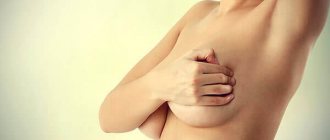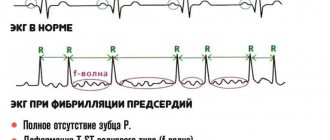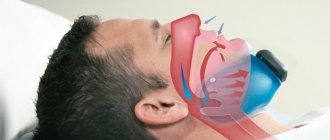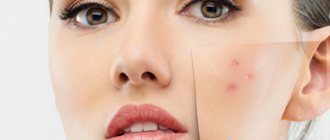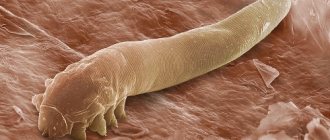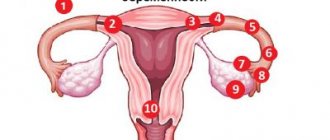03/26/2018 Category: Diseases and complicationsAuthor: Anastasia Pashchenko
During pregnancy, the state of each woman's body is unique. Some do not notice any special changes in their health and easily endure all nine months of pregnancy, while others experience a lot of inconvenience and discomfort from the first days of expecting a baby. The formation of acne during pregnancy is one of the unpleasant accompanying phenomena during this period, which indicates the beginning of hormonal and physiological changes in the body. In addition to emotional distress due to the unaesthetic appearance of the skin, a woman may also experience pain from acne. In such a situation it is necessary to treat them, but it must be done correctly.
- Localization of acne
Photo gallery: locations of acne in pregnant women
- Proper nutrition
Video: using cosmetics during pregnancy
- Reviews about getting rid of acne using traditional methods
Causes of acne during pregnancy
Most women experience acne on the face during pregnancy. The localization of rashes is usually on the face, décolleté, chest and causes a lot of unpleasant experiences.
Several factors are to blame for this:
- Due to the intense production of progesterone , which is responsible for maintaining pregnancy, a change in hormonal levels occurs. A side effect of this hormone is increased activity of the sebaceous glands. The ducts cannot cope with this, the pores become clogged and inflamed. This condition usually goes away after childbirth.
- Lack of water in the body. It should be taken into account that during pregnancy a woman’s weight increases, so the amount of fluid consumed should also be greater.
Lack of water in a pregnant woman's body can cause acne on the face.
- Stress. Any experience affects the state of the nervous system and can cause a malfunction of the hormonal glands, which leads to the appearance of unpleasant rashes on the skin.
- The cause of skin inflammation may be heredity . If a woman’s close relatives had skin problems during pregnancy, then there is a chance that she will have them too.
- What a woman eats is also of great importance. If your diet includes a lot of carbohydrates, then you need to reconsider it and switch to healthier foods.
Most often, acne occurs in the first trimester. At a later date, their number noticeably decreases or they disappear completely. This happens differently for every woman.
Localization of acne
Pimples during pregnancy appear in any area of the face and body. As a rule, they do not appear just like that - the appearance of rashes indicates some change in the functioning of the body. Pimples are localized in different places:
- The face is the most common location for pimples. Active work of the sebaceous glands, diseases of the gastrointestinal tract, gynecological diseases - all this can cause a rash of pimples on the face.
- Breast. In the chest area, acne forms due to hormonal changes in the body of a pregnant woman. An unbalanced diet for an expectant mother can also cause acne.
- Back. Liver diseases, excessive sweating, lack of careful hygiene lead to the appearance of pimples on this part of the body.
- Buttocks. Hypothermia is the cause of acne in this area of the body.
- Stomach. Poor nutrition, poor hygiene, and non-breathable synthetic clothing lead to the formation of pimples on the stomach.
Photo gallery: locations of acne in pregnant women
In most cases, acne is localized on the face of a pregnant woman
The appearance of acne on the chest can be a consequence of poor-quality underwear and clothing.
Pimples on the back often appear due to lack of careful hygiene.
Acne on the stomach can be an allergy to both food and hygiene products
Acne on the face and body of a pregnant woman may be due to allergies. Therefore, while expecting a baby, you need to be especially careful when choosing food products, as well as use high-quality cosmetics for face and body care.
For a long time, before and throughout my pregnancy, I suffered from small and frequent rashes on my forearms - an unaesthetic sight. No fighting methods helped get rid of them. During the postpartum period, the pimples on my arms disappeared and I can again wear short-sleeved clothes without hesitation!
Diagnostics
Minor skin rashes do not require any treatment other than the use of special creams and folk remedies. If there are a lot of pimples and they cause pain, then you should consult with specialists - a gynecologist, dermatologist, gastroenterologist, endocrinologist .
You should also definitely consult a doctor if, in addition to regular acne, there are other formations - boils and carbuncles, since their appearance may be a signal of a serious malfunction in the body. In this case, only a doctor can prescribe adequate treatment that does not threaten the health of the fetus.
Pharmacy products
During pregnancy, taking many drugs is strictly contraindicated, as they cause abnormalities in the development of the fetus. Most medications used to treat acne are also banned.
You cannot use products that contain the following components:
- vitamins of group A – retinoids;
- steroids;
- benzene;
- peroxide (hydrogen peroxide);
- antibiotics;
- salicylic acid.
However, there are medications for the treatment of acne that have no contraindications. You can choose a safe drug of different forms (cream, gel, masks, etc.) and price categories.
| Name | Effect | Features of application | Price |
| Zenerit (lotion) | Improvement in skin condition already in the first week of use (full course 12 weeks). The skin does not shine after it, it can be used under decorative cosmetics. | Apply to cleansed skin 2 times a day. Avoid contact with mucous membranes of the nose, eyes, and mouth. | 642-670 rub. |
| Skinoren (gel, cream) | Visible result after 2-4 weeks of use (full course 4-6 months). Suitable as a base for cosmetics. | Apply to cleansed skin 2 times a day. Avoid contact with mucous membranes; after use, wash your hands thoroughly with soap. | 15 g – 480 rub. 30 g – 845 rub. 50 g – 1170 rub. |
| Cosmetic clay (green, black, blue, white) | Relieves inflammation and redness after the first application (the course is unlimited). Tightens pores, refreshes complexion. | Apply a clay mask to previously cleansed skin for 15 minutes. Wash with warm water. Apply 2 times a week. | 30-60 rub. |
| Bepanten plus (cream) | Relieves inflammation, eliminates redness, itching, and pain (treatment course is 15 days). Does not leave greasy marks, does not stick. | Apply to damaged areas several times a day. | 30 g from 442 rub. 100 g from 790 rub. |
| Ugresol (lotion) | Dries out inflammation and has an antimicrobial effect (course of treatment is approximately 3 months). | Not suitable for dry skin. Apply to cleansed skin in the evening, every other day. | From 140 to 170 rubles. |
All of the above products are approved for use during pregnancy, but, nevertheless, you should consult your doctor before purchasing.
If for any reason the medications are not suitable (contraindications, allergies), then you can turn to traditional medicine. There are several ways to care for your skin at home - masks, fruit peels, decoctions for washing.
What can be done?
Acne caused by a hormonal surge will go away after the birth of the child and normalization of hormonal levels, which may take a couple of months4. In the meantime, while you are going through pregnancy, the optimal strategy in the fight against acne will be non-drug and gentle preventive therapy. Here are some tips to improve your skin's condition.
- Wash your face properly . Use special mild, soap-free (based on other surfactants) products that do not contain fragrances or alcohol. Rinse your face thoroughly with warm, not hot, water. Pay special attention to the areas around your hairline and jaw, where pores are most likely to become clogged. Dry yourself carefully with a soft, dry towel. You need to wash your face twice a day (morning and evening), but not more often (except for those days when you have training) to avoid drying out your skin.
- Try natural remedies . Consider using an oatmeal scrub to unblock clogged pores. But do not rub it too vigorously, as the skin of a pregnant woman can become very sensitive and susceptible to mechanical influences. It is better to replace cosmetic masks with fruit and berry ones. You can easily make them at home by mashing, for example, strawberries, raspberries, apricots to a mushy state, and adding a little lemon juice. Clay masks without additives are also suitable. Use such facial care products no more than 1-2 times a week.
- Choose oil - free moisturizers. Use an oil-free moisturizer or facial serum. Avoid over-application as excess can block pores.
- Take care of your hair . Wash your hair regularly to get rid of sebum that accumulates at the roots of your hair. Change your pillowcase at least 2 times a week, wash your hats more often. If you have long hair or bangs, keep them out of your face.
- Avoid introducing bacteria . Keep your hands away from your face because there are bacteria on your fingers.
- Use headphones . When talking on the phone, do not put the phone close to your face.
- Drink more water . Drink enough pure water and minimize coffee consumption.
- Make sure your diet is healthy . Eliminate (or reduce) sugar and refined grains (choose whole grains). Additionally, unhealthy fats (saturated fats, found in fried foods and many baked goods) can also make acne worse. Therefore, replace them with healthy fats, which can be found in walnuts, almonds, salmon, and avocados. Also, for healthy skin, eat more fresh, colorful vegetables and fruits. And you can even have a small amount of chocolate (dark is better), but do not overdo it, as it contains caffeine.
- Get vitamin A. Add to your list foods containing vitamin A, which has a good effect on skin condition: eggs, milk, fish, carrots. But avoid supplementing with this element, as some studies have shown that high concentrations in the body may be linked to birth defects. Learn more about what to be careful of during pregnancy.
Traditional remedies
The issue of using medicated creams, ointments and other medications to treat acne deserves special attention. Most drugs are prohibited for use during pregnancy, as they can lead to serious complications and malformations of the fetus. Even those applied externally penetrate through the skin into the mother’s blood and through the placenta to the baby. Therefore, do not start using any medicine without consulting a specialist. In most cases, such a risk is not justified.
It's difficult to talk about the actual potential harm because there have been no large studies of acne medications in pregnant women. What we do know comes from animal studies and some data from women who used medications to treat acne during pregnancy.
However, there are a number of ingredients that are effective in combating acne, which, according to the American Academy of Dermatology, are acceptable during pregnancy. Your doctor may recommend a drug based on one of these.
- Azelaic acid . Has antimicrobial and mild anti-inflammatory properties. Considered safe for use during pregnancy. No birth defects were found in animal studies. In the West it is a prescription drug, although in our country it is available without a prescription.
- Benzoyl peroxide . Often found in acne medications that can be purchased without a prescription. Experts say this product can be used in limited quantities. Therefore, you need to talk to your doctor first.
- Salicylic acid . There is a huge range of products containing this substance, including expensive skin creams and pharmaceutical products. Salicylic acid is generally considered safe when used for a limited time. But since there has been no research on its topical use, some experts recommend against using it.
- Zinc . Studies conducted in humans, including pregnant women, have not established a relationship between the use of zinc for acne and any fetal abnormalities. This substance has an anti-inflammatory, antibacterial effect and helps reduce sebum production. During pregnancy, the permissible daily intake is 11 mg.
Homemade masks
The use of traditional medicine is often more effective than traditional acne treatments. There are a lot of masks based on natural ingredients, and there are also those that help get rid of acne.
| Name | Recipe | Application Features |
| Egg white mask | Separate the white from the yolk, beat in a blender until a stiff foam appears. | Apply to clean face for 15 minutes. Rinse with water. |
| Baking soda mask | Add a drop of warm water to a tablespoon of baking soda to make a paste. | Apply to damp facial skin for 20 minutes. Wash with warm water. |
| Potato mask | Boil potatoes in milk. Then knead into a homogeneous mass. | Apply warm paste to clean skin for 15 minutes. |
| Honey mask | Mix equal proportions (50 g each) of honey and vegetable oil. Add raw egg yolk to the resulting mass. Stir until smooth. | Apply to face and décolleté for 20 minutes. |
| Oatmeal mask | Soak the oatmeal for 15 minutes in warm water. | Apply the mixture to problem areas until completely dry. Then rinse with warm water. |
Homemade decoctions for washing
Acne on the face during pregnancy can also be treated with herbal decoctions. The popularity of their use is explained by their ease of preparation, use and low cost. They also have no contraindications other than individual intolerance.
| Name | Recipe | Application Features |
| Chamomile decoction | Boil 2 tbsp in a water bath. herbs in 1 tbsp. water. Strain, cool. | Apply to affected areas of skin 2 times a day. |
| Celandine decoction | 2 tbsp. celandine, pour 0.5 liters of water, cook in a water bath for 7 minutes. Strain, cool. | Use morning and evening as a wash or lotion. |
| Calendula infusion | 1 tbsp. raw materials pour 250 ml of boiling water. Leave for 30 minutes, strain. | Can be used several times a day for wiping or lotions. |
| Infusion of elecampane | 1 tbsp. herbs pour 200 ml of boiling water. Leave for 40 minutes, strain. | Use once a day, in the evening for washing or lotions. |
| Decoction of mint, green tea and chamomile | Mix the raw materials in equal proportions (1 tsp each), pour in 1 tbsp. boiling water, leave until completely cooled. | Use several times a day. |
Due to the fact that products prepared at home do not contain preservatives, they cannot be stored for a long time. You can use decoctions throughout the day. For next use, it is better to prepare a fresh infusion or decoction.
How to remove acne for a pregnant woman?
Of course, identifying the irritating factor will not be superfluous, but the very fact of identifying the cause of the skin lesion will not remove acne during pregnancy; they will have to be treated or at least alleviate the condition and prevent further growth of the rash.
Unfortunately, it is impossible to change hormonal levels; any attempts to do so are contraindicated, with the exception of therapy with hormones on the recommendation of a doctor. If acne was caused by hormonal changes, it means that they will have to be treated in the distant future, and during pregnancy only an improvement in the condition of the skin is possible.
So, you can completely remove or significantly reduce acne on the skin if you implement one of the recommendations of cosmetologists; let’s list and consider them.
- Pregnant women are often advised to use clay masks and apply natural fresh fruits or vegetables to the skin.
- Fruit peels and treatment with herbal tinctures turned into ice are not contraindicated for them - such a cool effect helps to quickly tighten the pores.
- It is better to carry out personal hygiene measures two or even three times a day, while ensuring normal cleansing of the pores - sebum must be removed, but the skin should not be allowed to dry out too much. Cleansing procedures can only be arranged if the instructions for the drugs used do not contain any contraindications for pregnant women.
- Vitamin complexes should be taken strictly under medical supervision, usually regulated by the gynecologist himself.
- If a woman needs to use any cream, then it is better to let it be a cream with a gentle moisturizing effect, while the texture of the product should be light and the fat content should not be too high.
- Cosmetics that are safe and have only beneficial effects are suitable for pregnant women; they are ideally made from everything natural.
- In general, it is not recommended to apply an extra irritant in the form of foundation, but if there is such a need, then you should use it for a short time and try to remove it from the skin faster. It should not be any cream to create tone, but hypoallergenic, non-comedogenic.
- It is necessary to adhere to a proper diet, composed without deficiency or excess of substances needed by the body. Most women should not deprive themselves of vegetables, fruits, fermented milk foods, and healthy cereals. It is unacceptable to introduce into the menu such harmful things as certain types of chocolate, fried foods, all kinds of sweets, and smoked foods.
- To prevent various disruptions in the body and problems such as pimples or acne, you need to monitor your stool and avoid the slightest constipation.
- In the absence of the pathology of polyhydramnios or swelling on the body, you should fully provide yourself with clean water and drink it in sufficient quantities.
- Pregnant women should be careful when choosing cleansers; they should not contain fragrances, hormonal components, or alcohol. It is better to wash your face without abrasive assistants, that is, do not use aggressive peelings or rough washcloths.
Methods for treating acne during pregnancy
There are many ways to effectively and safely treat pimples and acne, but, unfortunately, pregnant women continue to suffer from skin problems because they simply do not realize that the simplest procedures available to everyone can be the solution. Let's list them.
- Cinnamon powder and natural high-quality flower honey - take these ingredients one spoon at a time, mix, and apply directly to areas affected by acne or pimples. You can leave the mask on overnight and wash it off in the morning.
- To improve the condition of your skin, you should wipe your face from time to time with a piece of pumpkin, which can be successfully stored in the refrigerator at home for a very long time. The main thing is to use a freshly cut cube of this product every time.
- Dissolve a ten-gram fragment of mumiyo in a spoon of boiled water. Separately, stir a couple of teaspoons of natural honey and do this in a water bath. The two resulting solutions must be combined and applied to the face, the exposure time should be maintained for less than half an hour, then rinsed off.
- Grind sour apples and horseradish, take equal amounts of each component, rinse with water after half an hour of exposure, this method is suitable for everyday use, the course lasts two weeks.
- To destroy harmful bacteria on the face, take equal parts of calendula and chamomile plants, optimally a teaspoon in a glass of water, brew with hot water and, when cooled, apply the swollen leaves that form a paste to the face. This effect can last about twenty minutes.
- The decoction prepared according to the previous recipe should not be destroyed; it is better to improve it by adding a couple of crushed tablets of the drug furatsilin to it. If you treat your acne-affected face at night and repeat this several times, you can achieve a noticeable healing effect.
- The medicinal plant agave is not contraindicated for pregnant women to combat acne. Grind its leaves to a pulp, adding water in a ratio of one to five, you need to boil the product using a water bath. A ready-made lotion that can be used to wipe your face helps with complex cases of acne and pimples.
It doesn’t matter whether a woman has acne during pregnancy, she should in any case visit a dermatologist in a timely manner. Only under medical supervision will it be possible to cure the skin without negatively affecting the body where the child is developing.
Homemade fruit peeling
Acne on the face can also be removed with fruit peeling, which is safe during pregnancy. This popular facial cleansing method is used not only to remove acne, but also to eliminate small scars, pigmentation, and wrinkles.
Fruit peeling is considered one of the most effective methods for eliminating skin problems, which can be used not only in the salon, but also at home. There are three types of peeling with fruit acids - deep, medium, superficial.
Deep and medium peels are most often used to correct minor wrinkles and reduce pigmentation. Deep and medium peelings cannot be used during pregnancy ; the latter has no contraindications, since it only acts on the top layer of skin. The procedure can be used no more than twice a week.
To ensure that peeling does not harm the skin, you need to follow the recommendations for its implementation:
- cleanse the skin with a scrub or tonic;
- carry out a test for an allergic reaction (apply a small amount of the product for 1 minute on the elbow);
- apply peeling to the skin, avoiding the area around the eyes, for 15 minutes;
- rinse with cold water;
- apply nourishing cream.
The effect of fruit peeling is noticeable after the first procedure and it lasts for quite a long time. With regular use of this method, skin rashes practically disappear.
Prevention
You can reduce the likelihood that during pregnancy your skin will begin to become covered with pimples and acne by using preventive measures recommended by doctors:
- Delicate cosmetics. Cleansing your face during pregnancy is simply necessary, but the products for this should be chosen as soft as possible, not irritating or drying out the skin. And it is advisable to avoid decorative cosmetics completely or apply them as rarely as possible.
- Allergy tests. Pregnant women need to test everything - from food to cosmetics. During this period, skin sensitivity and taste preferences change. And the body’s reaction even to familiar things can be unpredictable.
- Fresh air. It is simply necessary for the normal functioning of a pregnant woman’s body. Naturally, these should not be walks on polluted streets, where the pores only become even more clogged. You need to go out to parks and green areas. Ideally, if you have the opportunity to travel out of town at least a couple of times a month.
- Drinking regime. If under normal conditions an adult needs to drink 1.5 liters of clean water per day, then during pregnancy this volume increases to 2 liters. On the other hand, you should also not drink too much - this overloads the kidneys and increases the likelihood of acne.
- Limiting salt. It promotes fluid retention in the body, making it difficult to eliminate toxins. In addition, ready-made pickles and canned food may use chemical additives that will be perceived by the pregnant woman’s body as toxins.
- Calm. Allows the body to smoothly adapt to periodic changes in hormonal levels. Reduces the amount of adrenaline and cortisol, which provoke increased activity of the sebaceous glands.
- Adsorbent masks. During pregnancy, masks prepared at home using folk recipes based on cosmetic clay or with the addition of activated carbon can be an excellent preventative measure. Salt and soda also have excellent adsorbing properties, but they can be very irritating to delicate and very sensitive skin.
In addition, it is important to appear on time for a consultation with the observing gynecologist. He will immediately pay attention to any changes in the condition of the skin and tell you what harmless and child-friendly methods you can use to get rid of pigmentation and rashes.
Steam baths
One of the effective methods for treating skin rashes is steam baths.
But, before using this procedure, it is advisable to consult a doctor, as it has contraindications:
- rosacea (increased fragility of blood vessels);
- purulent acne (heating can have the opposite effect);
- hypertension (any increase in temperature can cause a surge in pressure);
- bronchial asthma (heating can cause bronchoconstriction and cessation of breathing).
If there are no contraindications, then you can safely begin the procedure. By following the rules for using this method, it is quite possible to get the desired result fairly quickly.
Stages of implementation:
- prepare a herbal decoction;
- pour it into a small bowl;
- make sure that hair does not get in the way;
- tilt your face over your pelvis;
- cover with a terry towel;
- finish in 10 minutes;
- blot your face with a napkin;
- apply cream.
When treating problem skin, once a week will be enough. For the decoction, you can use a variety of herbs that help relieve irritation and have an antiseptic effect (calendula, chamomile, eucalyptus, etc.).
Proper nutrition
A pregnant woman's taste preferences change significantly, which can also lead to skin problems. An important factor is a balanced and proper diet.
Acne on the face during pregnancy is caused by fatty foods and foods high in carbohydrates.
These are products such as:
- pork, fast food - due to the content of large amounts of animal fat;
- cow's milk - can cause an allergic reaction in the form of a rash in those who have problems digesting lactose;
- sweets and baked goods in large quantities - due to carbohydrates;
- juices in tetra-packs and carbonated water cause fermentation in the intestines and, as a result, various rashes on the skin.
To support your body and avoid skin problems during pregnancy, you need to eat the following foods:
- kefir, fermented baked milk, yogurt, etc.;
- fresh fruits and vegetables;
- lean meats;
- cereal porridges (rolled oats, millet, buckwheat);
- coarse rye bread;
- green tea;
- natural fruit and vegetable juices.
Such a diet will not only get rid of acne, but also improve the functioning of the body as a whole. The good health of the expectant mother is the key to the proper development of the fetus and the birth of a healthy child.
Factors provocateurs
The condition of the skin is influenced by various external and internal factors, due to which pimples and acne may appear not only during pregnancy. But since during this period a double burden falls on the body, their presence leads to a sharp increase in the number of rashes.
The main cosmetologists include:
- Lack of sleep and stress. They negatively affect the functioning of the nervous system and sharply reduce immunity. Due to strong or prolonged experiences, hormonal levels change, and they are already unstable in a pregnant woman.
- Unbalanced diet . During pregnancy, the expectant mother tries to diversify her diet and exclude harmful foods from it. But due to toxicosis, women often refuse healthy food.
- Bad habits. Needless to say, from the first day of pregnancy, and ideally six months before it, a strict ban on smoking, alcohol and drugs is necessary. However, expectant mothers often indulge in excesses that poison the body and cause acne.
- Lack of oxygen. Pregnant women simply need to walk in the fresh air as much as possible. An organism working for two requires an increased amount of oxygen. It is especially harmful to stay in rooms with constantly turned on air conditioners and heaters for a long time.
- Dehydration. It is known that toxins are eliminated dissolved in water. The mother's body must also process the waste products of the baby growing inside her. With a lack of fluid, small rashes occur - they are one of the signs of intoxication.
- Incorrect care. Skin sensitivity increases significantly during pregnancy. Therefore, you may develop an allergy to some common skincare products. But simply abandoning them is not enough - you need to find something to replace them with. Otherwise, the pores will begin to clog and acne will appear.
- Exacerbation of chronic diseases. The double load on a pregnant woman’s body can easily provoke an exacerbation of existing chronic diseases. And the symptoms of many of them are acne and age spots on the skin.
As you can see, these provoking factors directly affect whether acne appears during pregnancy. If you immediately try to completely eliminate or at least minimize their effects, then it is quite possible to keep your skin clean.
Using cosmetics
Any woman always wants to look good, but during pregnancy you need to be more careful when choosing cosmetics. Many creams contain substances that can harm the unborn baby.
It is strictly forbidden to use creams, lotions, etc. if they contain:
- salicylic acid;
- hydrogen peroxide (peroxide);
- vitamin A derivatives;
- benzene group;
- any antibiotics;
- alpha acids;
- steroids;
- roaccutane and accutane;
- Isotretinoin.
All these components can cause fetal malformations and miscarriage.
Before purchasing any cosmetic product, you should carefully study the instructions and contraindications. It is advisable to consult a gynecologist and dermatologist.
When selecting decorative cosmetics, it is important to focus not only on the composition, but also on the shelf life. also advisable to avoid mattifying products - foundation, powder, corrector, as they cause clogging of pores, which in turn can lead to the formation of a rash. There are no contraindications for mascara, lipstick and eye shadow.
Treatment options
Pimples during pregnancy can be treated, especially if they cause discomfort or pain. But it should be borne in mind that not all treatment methods are suitable for pregnant women - the main factor in choosing a remedy is its safety for the unborn child.
Proper nutrition
If a single pimple or rash appears on any part of the body, the first thing you need to do is adjust your diet. During pregnancy, it is advisable not to eat hot, spicy, salty or sweet foods. You should add healthy foods to your daily diet: fruits, vegetables, herbs, fish, lean meat, dairy products. If the amount of vitamins in food is insufficient, then it should be replenished by taking additional vitamin complexes for pregnant women.
The diet must also be observed: it is not recommended to allow overeating and attacks of hunger - these conditions of the body lead to disruption of the digestive organs.
A healthy diet reduces the risk of acne
Poor nutrition during pregnancy can lead not only to the appearance of acne, but also to changes in blood pressure, edema, and impaired placental circulation!
Selection of decorative cosmetics
Many women, being pregnant, cannot refuse to use decorative cosmetics. In this case, you should make sure that cosmetics do not cause allergic reactions, dermatitis, or age spots. You should also pay attention to the composition - it is better to give preference to cosmetics with natural ingredients without dyes and fragrances. It is strictly forbidden to use products that contain salicylic acid, parabens, hormones, peroxides, retinoids, flatates, benzene, or steroids.
You should not use cosmetics that have expired.
If possible, it is necessary to avoid mattifying products: powder, corrector, foundation - they clog the skin, not allowing it to breathe, which subsequently leads to single or massive popping out of pimples.
Mascara and light lip gloss, when used in moderation, will not harm the health of the expectant mother and her child.
Video: using cosmetics during pregnancy
Pharmacy products
During pregnancy, many medications are contraindicated. Particularly dangerous are products containing antibiotics and hormones. It is also undesirable to use products containing alcohol. All these substances can have a detrimental effect on the development of the unborn child.
During pregnancy, it is not prohibited to use Skinoren gel on any area of the skin, provided there are no discomfort (allergies).
Other possible medications for getting rid of acne can be used only after being prescribed by your doctor.
Treatment with pharmaceutical products during pregnancy is possible only after the recommendation of a doctor!
Folk remedies
In the fight against acne, popular folk remedies include honey, lemon, herbs, baking soda, and more. The main condition for using these ingredients is the absence of allergies. Some recipes to help get rid of pimples:
- Herbal mask of calendula and chamomile. It is necessary to brew the plants in equal proportions, and then apply the cooled mixture to the face. Chamomile and calendula have anti-inflammatory properties, soothe the skin, relieving pain, and also dry out acne, promoting faster skin healing.
- Cinnamon and honey mask. Ground cinnamon should be mixed with honey in a 1:1 ratio. It is recommended to apply the mask directly to problem areas of the skin and keep it on the face for several hours.
- Horseradish and apple mask. Grate and mix the ingredients in equal proportions, apply to the face and keep for about half an hour a day.
- Ice cubes. You can freeze both plain clean water and herbal decoctions or juices of fresh berries and fruits. It is recommended to wipe your face with an ice cube every day - this procedure helps to narrow pores and relieve skin irritation.
- Clay masks. Dries acne on the skin. Their use is not prohibited during pregnancy.
- Mask with soda. A small amount of baking soda must be diluted with warm water to a paste consistency and applied to problem skin for 15–20 minutes. This mask is not suitable for frequent use!
- Rubbing the skin with a fresh vegetable or berry. A piece of cucumber, pumpkin or strawberry is ideal for this recipe. Vegetable cuts must be fresh and clean. When using the berry after the procedure, you must wash your face with warm water.
There are a considerable number of traditional medicines for treating acne. Any of the recipes can be effective - everything is individual!
When treating with folk remedies, it is necessary to exclude allergies to components in a pregnant woman.
Reviews about getting rid of acne using traditional methods
Girls, try ice cubes. I wipe my face with them, even when my skin is fine. Just brew some herbs (chamomile, celandine, St. John's wort), steep and pour into molds. In the morning, you take out such a cube and wipe your face. Even as a preventive measure it is very effective. Well, we do masks once or twice a week. But we wash them off not with ordinary water, but with vinegar (per 1 liter - no more than 1 spoon). Plus wash your face with some herbal decoction diluted with warm water.
Elena
https://www.colady.ru/prichiny-pryshhej-pri-beremennosti-sredstva-ot-pryshhej-dlya-beremennyx-zhenshhin.html#3
An egg mask helps me.) You need to beat the chicken protein until foamy, pour in aloe juice (about a spoon, no more) and apply this mixture evenly over your face. Let it sit for half an hour, then wash it off and apply some medicinal cream on top (which the doctor allowed). In principle, you can even just lubricate it with aloe juice. Just a lot of fuss - first wash the leaves, then dry them, then put them in paper (dark color!))) in the refrigerator for a week and a half. Well, then squeeze out the juice and smear it on.
Ekaterina
https://www.colady.ru/prichiny-pryshhej-pri-beremennosti-sredstva-ot-pryshhej-dlya-beremennyx-zhenshhin.html#3
I wash my face with tar soap, then wipe my face with calendula tincture. On top I apply “clean line” chamomile and strawberry cream. In the morning and in the evening. Very good effect.
Natasha
https://www.baby.ru/community/view/126291/forum/post/3877228/
What is forbidden to do if acne forms during pregnancy?
While expecting a baby, you should consciously choose treatment methods that are safe for the child. There are some ways to get rid of pimples that are prohibited during pregnancy:
- use of laser and phototherapy;
- use of chemical peels and scrubs;
- squeezing pimples;
- facial cleansing in a beauty salon.
All prohibited procedures during pregnancy can have a negative impact on the fetus. Therefore, it is better not to risk the health of the unborn baby!
How to reduce breakouts during pregnancy
Acne on the face during pregnancy is not a death sentence. It is quite possible, if not to completely get rid of them, then to significantly reduce the number. The first thing you should do is contact a dermatologist who will prescribe the appropriate treatment.
It may contain the following recommendations:
- taking a vitamin complex;
- skin care using alcohol-free lotions;
- balanced diet;
- drinking enough fluid (at least 1.5 l);
- prevention of constipation.
In addition to this you can use:
- creams containing fruit and glycolic acids;
- clay masks;
- fruit peeling;
- washing with various herbal decoctions;
- steam baths.
Features of the condition
Pregnancy occurs when an egg that has matured and moved into the fallopian tube fuses with a sperm and then attaches to the wall of the uterus. To make this possible, a woman’s body cyclically produces various types of hormones that, among other things, affect the condition of the skin. After fertilization, the endocrine system makes background adjustments to ensure normal development and birth of the fetus.
First trimester
The main hormonal indicator that allows you to accurately diagnose the onset of pregnancy and even its duration is the level of the hCG hormone. By the way, this is the principle of operation of home tests that are so popular today. Immediately after fertilization, it rises sharply and then continues to grow. Also, the amount of progesterone in the blood of a pregnant woman is increased, causing increased sebum secretion.
HCG is a kind of regulator of the production of other hormones necessary for the normal course of pregnancy, including those produced by the thyroid gland. In addition, it significantly speeds up the process of cell division. The common statement that pregnancy rejuvenates the body is not far from the truth. Therefore, for many women, the skin becomes smooth and beautiful in the first trimester.
On the other hand, while the woman’s body has not yet adapted to the new state, and the fetus is not separated from the mother’s body by the placenta, many suffer from toxicosis. There is nothing strange about this - the waste products of the unborn baby enter directly into the blood of the pregnant woman. The body is actively trying to remove the increased amount of harmful substances, including through pores, which work very intensively and can become clogged with sebaceous plugs. Because of this, acne appears early during pregnancy.
Second trimester
The period from the third to the sixth month is considered the easiest and most favorable. Intense hormonal changes have already passed. The body adapted to its new state. The woman adapted to the increased loads and learned to cope with them. And psychologically she becomes calmer (if there is no threat of interruption).
At this time, acne on the face during pregnancy practically does not appear if you take proper skin care and follow the drinking regime. However, external and internal provoking factors, which we will talk about a little later, can contribute to an increase in the number of rashes. So you will have to pay special attention to your health and diet.
Third trimester
Shortly before giving birth, hormonal levels begin to change again. Pigment spots characteristic of pregnant women appear - chloasma. They usually go away on their own a few months after birth. The skin naturally reacts to such changes, and acne may reappear later.
About a couple of weeks before the birth of the baby, the hormone that causes uterine contractions, oxytocin, begins to be actively produced, as well as prolactin, which stimulates milk production. In addition, estrogens increase the production of serotonin, melatonin and histamine - hormones that ensure normal natural childbirth.
What not to do if acne appears during pregnancy
Acne on the face during pregnancy is not pleasant for any expectant mother. But in the pursuit of beauty, one should not forget about safety for the child.
Absolutely forbidden:
- squeeze out blackheads;
Pimples on the face during pregnancy should absolutely not be squeezed out.
- clean your face in a beauty salon;
- use chemical scrubs and peels;
- use phototherapy and laser.
All these procedures will have to be postponed until the baby grows up.
General rules
If acne appears on your face at the beginning of pregnancy, keep your skin clean . You need to cleanse your skin using special gels and foams. Preferably based on natural ingredients. It’s good if they contain chamomile, calendula or string.
Eat right. Try to eat more vegetables and fruits, do not indulge in fried and fatty foods, give up cheap sausages - they contain a lot of dyes, preservatives and other less useful components.
Try not to touch your face with your hands . And don't squeeze pimples. This will cause inflammation to spread to surrounding tissues, redness to appear over a large area of skin and the risk of microbes entering the bloodstream.
When will acne go away in a pregnant woman?
In most cases, acne disappears by the beginning of the second trimester. Repeated consultation with an endocrinologist and dermatologist will be required if acne does not go away after childbirth. This may indicate a serious hormonal imbalance. Timely assistance will help avoid health problems.
Acne on the face most often appears during pregnancy due to increased levels of the hormone progesterone in the blood, which is responsible for the safety of the fetus. After childbirth, the level of the female hormone estrogen increases. This surge in hormones most often causes acne. Therefore, sometimes it is better to just go through this period calmly, because the birth of a baby is worth it.
Text design: Natalie Podolskaya
Why do acne appear on the face during pregnancy?
Acne on the face appears not only during menstruation, but also during pregnancy. And there are many reasons for this. Let's look at the ones that are most common.
- Increased production of sebum , called sebum. This is due to constant surges in hormones – estrogen and progesterone. Sebum becomes thick, it clogs pores, which means microbes grow and multiply here.
- Dehydration of the body . Acne during pregnancy on the face in the early stages appears as a result of severe toxicosis. If the woman does not receive help, the symptoms of toxicosis will lead to severe dehydration.
- Increased nervousness and stressful situations . Mood swings, constant worries, fears and the desire to give birth as quickly as possible - this is what every representative of the fair sex experiences. In the old days they said that it is better for a pregnant woman to remain calm. And then the child will not be restless and whiny.
- Decreased immunity . Acne on the face may be the reason why your immune system needs support. And this is important for both the woman and the baby.
- Poor nutrition . Nothing fatty, spicy, too sweet, less salty, smoked and canned.
- Hygiene . Buy special products for cleansing your skin, use light creams morning and evening. And for prevention, apply scrubs twice a week. If you cannot overcome acne during pregnancy on your own, visit a doctor.
- Cosmetics. Poor-quality or expired cosmetics are a common reason why the skin deteriorates greatly during pregnancy. It is especially important to carefully study the composition of such products. The ideal option is natural cosmetics with a minimum amount of preservatives, dyes, and fragrances. But ideally, during pregnancy it is advisable to avoid any cosmetics. And it is even recommended not to dye your hair.
In pregnant women, acne on the face most often appears in the 1st trimester of pregnancy. And this is primarily due to hormone fluctuations. However, acne can appear in the second and even third trimester.
They do not appear in everyone. There are women who, in all 9 months, have never encountered such a problem. Firstly, each pregnancy proceeds strictly individually. And secondly, the hereditary factor plays a huge role. And if your mother or grandmother suffered from rashes, then most likely you will develop them too.
We looked at the main reasons. Now it remains to understand how to treat these rashes, and which drugs are preferable to use?

